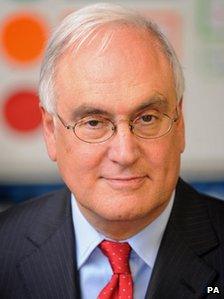Teachers call for Ofsted chief to resign
- Published

Sir Michael Wilshaw was asked to be chief inspector by Michael Gove
The National Union of Teachers (NUT) has called for the resignation of Ofsted chief Sir Michael Wilshaw over claims he is demoralising teachers.
The NASUWT teachers' union, meeting in Bournemouth, called for changes to the inspection system or else they would campaign for its abolition.
Ofsted said its inspections were helping raise educational standards.
The NUT is to debate a no-confidence motion in Education Secretary Michael Gove during its Liverpool conference.
Both teachers' unions are in dispute with ministers over pay, pensions and workload. They have announced local strikes for the summer term.
'Big Brother'
Teachers at the NUT conference also called on the union to find legal ways that would allow teachers to boycott inspections.
Delegates heard claims Ofsted was not an inspectorate but a politically-motivated "surveillance operation".
Roy Bowser, representing the union in Barnsley, said: "Mr Wilshaw you are Big Brother."
Mr Bowser accused Sir Michael of behaving like the education secretary's "junior minister" who oversaw an inspection regime that was "intrusive and invasive".
The NUT conference voted to continue to campaign for Ofsted's abolition.
But doubts were raised over the credibility of this call - and the proposals to find ways to boycott inspections in a way that would not be unlawful.
Simon Horne, from Haringey, said this was "grandstanding" which would create "cheap headlines, but an expensive failure".
Earlier the general secretary of the NASUWT Chris Keates said teachers understood the need for inspection, but believed it had become too "high stakes" because a bad Ofsted rating could lead to a school being taken over or turned in to an academy.
"It's creating a climate of fear in schools and doing nothing to raise school standards."
The government sees Ofsted as a key way of protecting and improving standards in schools, especially since many schools are becoming academies, independent from local authorities.
As chief inspector, Sir Michael has changed the categories schools are rated by, with the "satisfactory" rating becoming "requires improvement". It wants all schools to be rated above this as either "good" or "outstanding".
He has also called for a sharper focus on teaching, saying schools should only be given the highest rating - outstanding - if they are ranked outstanding for teaching.
'Tough message'
An Ofsted spokeswoman said: "Sir Michael has said from the outset any provision that is less than good is not acceptable.
"That's a tough message, especially for those schools and colleges that have been coasting. It's inevitable that when you challenge the system to do better, you will get some pushback."
She added that the inspectorate was independent and "was not about furthering any political agenda".
"Ofsted does not have a preferred model for schools. Ofsted's overall objective is to ensure that all children, regardless of the postcode they come from and regardless of whether they attend an academy, free school or maintained school, have access to a good quality education," she said.
"Across the school system, it is not the structure of a school that makes the biggest difference to performance, but the quality of leadership at the school. This is where our focus must lie if we are to make major improvements in the standard of education in England."
A spokesman for the Department for Education said the academies programme was "turning around hundreds of underperforming schools and introducing a "world class curriculum".
Ian Murch, NUT Executive: "Gove is intent on turning the curriculum back to the 1950s".
Changes to pay
Opposition to planned changes to pay and conditions for teachers are high on the agendas at the teachers' annual conferences and the NASUWT and the NUT are set to endorse plans for further strikes on these issues, plus workloads and pensions.
The government plans to bring in performance-related pay, meaning teachers will no longer receive semi-automatic pay rises as they gain experience.
It says the change will drive up teaching standards by giving head teachers flexibility to reward the best teachers.
But Christine Blower, general secretary of the NUT, says the change is "unnecessary and unwanted" and "is really about keeping pay down".
"It's not just about performance-related pay - it's about changing teachers' pay structures," she said.
She said teachers' starting pay, £21,000 per year, was not high for a graduate profession, so the expectation of increases was an incentive for recruitment.
Head teachers in academies already have the power to vary teachers' pay and conditions.
Dame Sally Coates, the head of Burlington Danes Academy in west London, said she supported the idea of performance-related pay and was using it.
"Most teachers like acknowledgement for their work. It will give heads autonomy," she said.
Teachers plan local strikes to begin in late June, after the exam season, and a national strike is planned for the autumn.
They are planning to hold rallies on strike days to gather support from parents, who could face disruption if schools are closed.
Parents group Parents Aloud recently complained about the prospect of more strikes.
- Published30 March 2013
- Published29 March 2013
- Published25 March 2013